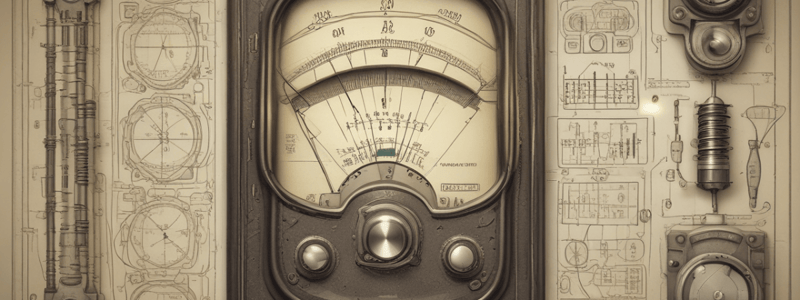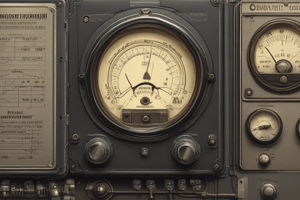Podcast
Questions and Answers
What is the primary function of the copper band in the driving system?
What is the primary function of the copper band in the driving system?
- To align the flux produced by the shunt magnet perpendicular to the supplied voltage (correct)
- To measure the power consumption in kilowatt hours
- To increase the rotation of the aluminium disc
- To reduce the eddy current in the aluminium disc
What is the purpose of the permanent magnet in the braking system?
What is the purpose of the permanent magnet in the braking system?
- To increase the rotation of the aluminium disc
- To reduce the rotation of the aluminium disc (correct)
- To measure the power consumption in kilowatt hours
- To generate a magnetic field around the conductor
What is the relationship between the number of rotations of the aluminium disc and the power consumption?
What is the relationship between the number of rotations of the aluminium disc and the power consumption?
- The number of rotations is directly proportional to the power consumption (correct)
- The number of rotations is independent of the power consumption
- The number of rotations is inversely proportional to the power consumption
- The number of rotations is equal to the power consumption
What is the principle behind the working of an electric energy meter?
What is the principle behind the working of an electric energy meter?
What is the function of the registration or counting mechanism?
What is the function of the registration or counting mechanism?
What is the primary function of a wattmeter in an electrical circuit?
What is the primary function of a wattmeter in an electrical circuit?
Which type of wattmeter is used for measuring both DC and AC power?
Which type of wattmeter is used for measuring both DC and AC power?
What is the function of the coil connected in series with the circuit in a wattmeter?
What is the function of the coil connected in series with the circuit in a wattmeter?
What is the primary function of an energy meter?
What is the primary function of an energy meter?
How many main parts does an energy meter have?
How many main parts does an energy meter have?
What is the primary purpose of an electric energy meter?
What is the primary purpose of an electric energy meter?
What is the function of a voltage coil in an electric energy meter?
What is the function of a voltage coil in an electric energy meter?
How is the power consumed by the load calculated in an electric energy meter?
How is the power consumed by the load calculated in an electric energy meter?
What is the unit of measurement for electrical energy consumption in an electric energy meter?
What is the unit of measurement for electrical energy consumption in an electric energy meter?
What is the purpose of periodic calibration of an electric energy meter?
What is the purpose of periodic calibration of an electric energy meter?
What is the minimum number of CT's required to accurately meter a three-phase, four-wire wye service?
What is the minimum number of CT's required to accurately meter a three-phase, four-wire wye service?
What is the unit of reactive power typically measured in?
What is the unit of reactive power typically measured in?
Why is a single-phase varmeter not suitable for measuring reactive power in high-voltage circuits?
Why is a single-phase varmeter not suitable for measuring reactive power in high-voltage circuits?
How many wattmeters are required to measure the reactive power in a three-phase balanced load?
How many wattmeters are required to measure the reactive power in a three-phase balanced load?
What is the phase angle between voltage and current in a single-phase varmeter?
What is the phase angle between voltage and current in a single-phase varmeter?
What is the main reason a 3-phase meter is needed in Indian households?
What is the main reason a 3-phase meter is needed in Indian households?
What is the total number of slots in a three-phase energy meter?
What is the total number of slots in a three-phase energy meter?
What is the main reason why the three-phase system has a higher efficiency compared to the single-phase system?
What is the main reason why the three-phase system has a higher efficiency compared to the single-phase system?
What is the significance of the 120º phase difference in the three-phase system?
What is the significance of the 120º phase difference in the three-phase system?
How are the phase wires connected to the meter in a 3-phase metering system?
How are the phase wires connected to the meter in a 3-phase metering system?
What is the function of the two remaining slots in a three-phase energy meter?
What is the function of the two remaining slots in a three-phase energy meter?
What is the main difference between the star connection and the delta connection in the three-phase system?
What is the main difference between the star connection and the delta connection in the three-phase system?
What is the main difference between a three-phase, three-wire meter and a three-phase, four-wire meter?
What is the main difference between a three-phase, three-wire meter and a three-phase, four-wire meter?
What is the condition for a three-phase load to be considered balanced?
What is the condition for a three-phase load to be considered balanced?
What is the purpose of Blondel's Theorem in relation to metering a three-phase service?
What is the purpose of Blondel's Theorem in relation to metering a three-phase service?
What is the primary benefit of using a 3-phase energy meter in industrial and commercial applications?
What is the primary benefit of using a 3-phase energy meter in industrial and commercial applications?
What is the recommended load requirement for using a 3-phase energy meter?
What is the recommended load requirement for using a 3-phase energy meter?
What is the main difference between a 3-phase power system and a single-phase power system?
What is the main difference between a 3-phase power system and a single-phase power system?
Why is it important to analyze a 3-phase balanced load on the basis of each phase?
Why is it important to analyze a 3-phase balanced load on the basis of each phase?
What is the main advantage of using a 3-phase energy meter in areas with a heavy electric load?
What is the main advantage of using a 3-phase energy meter in areas with a heavy electric load?
What is the relationship between the reactive power and the cosine of the angle between voltage and current?
What is the relationship between the reactive power and the cosine of the angle between voltage and current?
What is the condition for a single phase power circuit to be fully resistive in nature?
What is the condition for a single phase power circuit to be fully resistive in nature?
What is the direction of energy flow in a circuit with active power?
What is the direction of energy flow in a circuit with active power?
What is the significance of the value of cos2ωt in a single phase power circuit?
What is the significance of the value of cos2ωt in a single phase power circuit?
What is the name given to the power consumed due to the resistive effect of an electrical circuit?
What is the name given to the power consumed due to the resistive effect of an electrical circuit?
Flashcards are hidden until you start studying
Study Notes
Wattmeter and Energy Meter
- A wattmeter is an instrument used to measure electric power given to or developed by an electrical circuit.
- There are two types of wattmeters:
- Electrodynamometer wattmeter (for both DC and AC power measurement)
- Induction wattmeter (for AC power measurement only)
- A wattmeter consists of two coils:
- One coil is connected in series with the circuit (current coil)
- One coil is connected in parallel with the circuit (voltage coil)
Energy Meter
- An energy meter is a device used to measure and record the consumption of electrical energy.
- It is widely used in residential, commercial, and industrial settings to ensure accurate metering of electricity usage.
- An energy meter has four main parts:
- Driving System (electromagnet and copper band)
- Moving System (aluminium disc)
- Braking System (permanent magnet)
- Registering System (counting mechanism)
- The working principle of an energy meter is based on Faraday's law of electromagnetic induction.
- The energy meter measures the power consumption of a load by interacting the magnetic fields of a current coil and a voltage coil.
How an Energy Meter Works
- Current Measurement: The energy meter measures the current flowing through it using a current coil.
- Voltage Measurement: The energy meter measures the voltage using a voltage coil.
- Electric Energy Calculation: The energy meter calculates the power consumption by multiplying the instantaneous voltage and current values.
- Power Calculation: The power consumed by the load is calculated by multiplying the voltage and current values.
- Energy Integration: The energy meter integrates the power over time to calculate the total energy consumption.
- Display and Communication: Modern energy meters have digital displays and communication capabilities to transmit data remotely.
Application of Energy Meters
- Single-phase energy meters are used in residential and small commercial settings.
- Three-phase energy meters are used in industrial and commercial settings with high electrical loads.
- Three-phase energy meters are suitable for measuring energy consumption in factories, power requirements in commercial buildings, and consumption of large machinery and equipment.
Types of 3-Phase Energy Meters
- There are two types of 3-phase energy meters:
- Three phases, three-wire meters (permanent horseshoe magnet)
- Three phases, four-wire meter (three coils and three aluminum discs)
Benefits of Using a 3-Phase Meter
- The ability to use different phases for different rooms.
- The ability to distribute the load.
- Real-time and recorded power consumption data.
- Protection of valuable equipment from high voltage damages.
Analysis of Three-Phase Systems
- A three-phase system consists of three phase conductors and a neutral conductor.
- The sum of the line currents in a 3-phase system is equal to zero.
- The three-phase system has several advantages, including:
- Fewer conductors required compared to single-phase systems.
- Continuous supply to the load.
- Higher efficiency and minimum losses.
- The three-phase system can be connected in two ways:
- Star connection (four wires, including a neutral conductor)
- Delta connection (three wires, no neutral point)### Three-Phase Loads
- A three-phase load can be balanced or unbalanced.
- A balanced load has equal magnitude and phase angle between the three phases.
- In a balanced load, all phase voltages and line voltages are equal in magnitude.
Three-Phase AC Generator
- A three-phase AC generator has three windings, each with two terminals (start and finish).
- Connecting a separate load across each phase winding would require six wires, making the system complicated and costly.
Blondel's Theorem
- Blondel's Theorem is used to determine the type of metering installation needed for a particular service.
- The theorem states that one less element (or CT) is required in a watthour meter than the number of wires in the service to accurately meter the service.
- For a single-phase two-wire service, a watthour meter with one stator (1s meter) is required.
- For a three-phase, three-wire service (delta service), a form 5s meter with two elements is required.
Reactive Power Measurement
- Reactive power (Q) is caused by the phase shift between voltage and current due to inductance and capacitance.
- Reactive power is denoted by Q and expressed in volt-amperes reactive (VAR).
- The formula for reactive power is Q = VI sin Φ.
- Reactive power measurement is essential to determine the nature of the load and measure power factor.
Measurement of Reactive Power in Single-Phase Circuits
- A single-phase varmeter (volt-ampere reactive meter) is used to measure reactive power in single-phase circuits.
- The varmeter has an inductive voltage coil, which causes the current to lag 90° behind the voltage.
- The meter indication is Q = VI sin Φ.
Measurement of Reactive Power in Three-Phase Circuits
- For a three-phase balanced load, the reactive power measured is the same in all phases.
- Only a single wattmeter is required to measure the reactive power.
- The current coil is inserted in one phase, and the voltage coil is connected across the remaining two phases.
Active Power
- Active power is consumed due to the resistive effect of an electrical circuit.
- It is also known as resistive power.
- The active power is always positive, regardless of the instantaneous direction of voltage and current.
- It is the rate of energy consumption by the load.
Studying That Suits You
Use AI to generate personalized quizzes and flashcards to suit your learning preferences.





